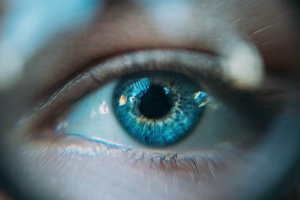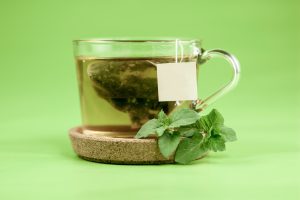Migraines & Headaches
Acupuncture for Styes and Eyes

A patient came in recently with the beginnings of a stye. Her left eye hurt and if she pulled her upper eyelid up, she was able to see enough minor inflammation to cause concern. “It always happens around this time of year,” she said. Why? Why?
Why did her eye stye fly (upwards)?
The eyes—especially and specifically the eyelids—are surrounded by the stomach vessel (this is why there are so many ophthalmological complications around diabetes). Insofar as circulatory directionality in the body, it is the stomach’s job (as well as the large intestine’s) to descend gases and fluids down and out; in contrast to its partners, the pancreas and spleen’s functionality to take food, transform it into nutrients, and send them UP. I digress.
In fall fluids and gases naturally want to descend. If we are not metabolically rooted or strong enough our body will fail to attract them downward. If inflammation is hyperactive in the upper portion of the body our body will fail to attract them downward. This is part of the reason fall allergies occur. It was also, in my opinion, the reason for this patient’s stye.
Because she was able to come twice in the same week, we ended up not needing herbs.
Based on pulse and pattern diagnosis this patient fell more into the former category: Digestion and energy were weak, both of which exacerbated by her menses—prone to dizziness and cramping, either implicating a deficiency of blood.
I needled the large intestine vessel’s point on the hand whose neurological pathway connects to the face, as well as the same vessel’s point by the elbow, whose pathway clears inflammatory heat (flaring upwards). These points alone should suffice in clearing the heat above. For the “vacuity below” I used Stomach 36, logically, to engender ample digestive enzymes and acids to attract (potentially) inflammatory gases downward. Since it is the liver vessel’s job to then SEND our manufactured blood UP to lubricate orifices, such as ophthalmologically, I used Liver 3, then finally the third eye point, Yin Tang, for local circulation, plus to calm the understandable anxiety one feels on the precipice of pain or crisis. Between treatments the patient was diligent about avoiding spicy foods and using warm compresses, and by the end of the week, VIOLA! No doctor’s visit or antibiotics necessary.
When gastric acids, enzymes, and/or blood are weak or thinned, it is only a matter of time before some manifestation of inflammatory and/or dry heat flares upwards. Chinese medicine understands this relationship better than most—it is also why a predominantly great diet and lifestyle are imperative.
Had this patient not recovered from her own self-care and our acupuncture, potential herbal ingredients could include chrysanthemum and/or mint flowers, gypsum stone if the eye felt burning or dry and she had thirst for cold drinks, angelica and chuanxiong root at low doses if she experienced much bloating or lack of appetite, but a high dose otherwise; finally, figwort root if there was additional dryness of the throat. If you or anyone you know is dealing with any ophthalmological issues, please consider holistic medicine to treat not just the symptom!
Chinese Medicine on Fainting, Dizziness

A friend of mine recently expressed having experienced great bouts of dizziness and fainting during the third trimester of her last pregnancy, which was in the dead of summer and was thus not surprising. I felt bad to hear of her struggles, but grateful that it inspired an idea for a new entry, on how Chinese medicine views fainting and dizziness, whether in pregnancy or not, and how we can treat or prevent it.
As with any Chinese medical diagnosis, the specifics get complicated, but we can still relatively easy to simplify into a couple of broad strokes. With any manifestation of dizziness, whether orthostatic, vertigo, passing out, or anything else, we are considering patterns of either blood deficiency, dampness, or a combination of the two, the latter of which obviously being the most difficult to treat. The final one is where your toddler at home forces you to “dance” with her around the house by spinning endlessly, for which there is no cure.
Blood Deficiency: More common in vegans, vegetarians, and pescatarians (most likely descending order), more common in women (especially while pregnant), the elderly, or anyone on long-term medications, which compromise the body’s absorption and capacity to produce blood. There is either a lack of cerebrovascular fluid or its flow and the head becomes faint.
Recommended treatment is herbs and moxibustion (acupuncture not as effective here), red meat or eggs, and earlier bedtimes.
Dampness: More common with obesity, more common in men, and/or people who consume a lot of alcohol, sugar, dairy, or raw foods. The microbiome grows congested with fluid retention, so the pathway by which our cellular energy carries healthy fluids to the brain is obstructed. “The clear yang qi cannot rise,” as we say, and our clarity or stability suffer.
Recommended treatment is minimizing all of the aforementioned foods, herbal medicine for 1-3 weeks to purge fluid retention, and acupuncture, especially along the vertigo line along the scalp located directly above the top of the ears. Note, this point will not be as effective on blood deficiency patterns, who are suffering a pattern of “deficiency,” not “excessive damp,” which responds better to aggressive manual treatment. As for self-care, drink hot ginger tea and black teas until symptoms subside.
Combination Blood Deficiency/Dampness: This is most common in pregnant women and very difficult to treat, because to nourish blood we must generate fluids, but to resolve dampness we must purge it. Not to mention the fact that we must be careful with purging fluid retention in pregnant women, since the fetus is ultimately a form of fluid retention—albeit an adorably magical one.
Dizziness and vertigo are serious conditions, not generally life threatening, although potentially dangerous when leading to the physical risks that accompany fainting. As always, Chinese Medicine can have much to offer in the way of hands-on treatment, internal medicine, and recommended self-care.
When in doubt: red meat, eggs, ginger tea, good rest, and steamed vegetables for the dampness.
Is Green Tea Healthy (for you)?
 In the western world we are often guilty of over-polarizing and labeling. This political viewpoint is good, that one is bad, this diet is healthy, that one is not. Further on that point, one food is healthy—while that one is not.
In the western world we are often guilty of over-polarizing and labeling. This political viewpoint is good, that one is bad, this diet is healthy, that one is not. Further on that point, one food is healthy—while that one is not.
While there are many foods that can be oversimplified and universally agreed upon—refined sugars are pretty much always bad and steamed vegetables good—most others depend on the dose, the patient, and time of year. For example, red meat in the winter for an anemic girl trying to conceive is eons more advisable than it is in the summer for an overweight male alcoholic trying to tame his heartburn. Also from a Chinese medical perspective, eating 5-6 ounces of red meat 1-3 times a week alongside vegetables will have an infinitely different systemic effect than 16 ounces 3-5 times a week alongside bread.
Green tea and kale have earned great reputations in the west, polarized as “good,” labeled “healthy,” and presumed to help anyone who consumes them, no matter the body type or time of year. From a Chinese medical perspective: False.
Almost anyone who’s ever drank green tea on a completely empty stomach has experienced the nausea or queasiness its bitter properties can induce. Bitter foods and herbs, while integral to a healthy diet and our pharmacopeia, are harsh on the stomach and less advisable for “Tai Yin” patients—those with weaker, more vulnerable stomachs. Such people generally do better with hot black teas, such as pu-erh or Earl Grey.
When written into herbal formulas, bitters are generally dosed lower and balanced with acrid and/or sweet-flavored herbs. This doesn’t mean to always consume your green tea with sweets, but it is that much more encouraged to never be drank cold or on an empty stomach. In fact, green is the one kind of tea we might encourage to take with honey—that is as long as you’re not the snob that I am, in refusal to corrupt any tea (or coffee) with outside flavors.
The same principle applies to kale. While undoubtedly possessing of all the literal health benefits it claims to, kale is a bitter green, therefore a bit more difficult to digest than other veggies. For this reason, it is important to always consume cooked, with warming spices, such as garlic, onions, or ginger to aid in proper metabolism. I’m not sure about honey on kale—maybe in the context of a salad—although in that case the raw food might cancel out any benefits of the honey. Better to have it with rice or yams to balance your “formula.”
According to teachers, green tea is best taken hot, more in the summer than winter, and more after a night of red meat and/or alcohol to sort of “drain” the heat that these foods create in the gut. Personally, I almost always drink green tea the morning after I go to baseball games! In these instances, the benefits far outweigh its “side effects.”
Please fall victim as infrequently as possible to the idea that certain foods are always healthy or unhealthy. This is rarely the case, also rare that the opinion of the general American public on anything health-related is accurately informed. If you have any questions about a particular food, please don’t hesitate to ask. And don’t take too much kale or green tea.
The Physiology of Wildfire Smoke (in NYC)
 While the sepia tones and brush aromas from this week’s Canadian wildfires’ spillover to the northeast might have looked great in a photograph, or smelled enticing in 1% of its dosage (if seated by a campfire with marshmallows), on the ground in real life it was daunting, and for many systemically disruptive. Personally, I was outdoors plenty, both on my commute and on my break at Union Square farmer’s market, albeit with a mask on, and thankfully did not experience symptoms.
While the sepia tones and brush aromas from this week’s Canadian wildfires’ spillover to the northeast might have looked great in a photograph, or smelled enticing in 1% of its dosage (if seated by a campfire with marshmallows), on the ground in real life it was daunting, and for many systemically disruptive. Personally, I was outdoors plenty, both on my commute and on my break at Union Square farmer’s market, albeit with a mask on, and thankfully did not experience symptoms.
Chinese Medicine nicknamed the lungs “the delicate organ,” which really they are not—in fact quite the opposite—however what is meant by this is their being most and primarily vulnerable to external pathogens. Toxic fumes are an external pathogen. They dry the sinuses and respiratory microbiome, which can bring with it symptoms such as chest oppression, frontal (or maybe temporal) headaches, and of course, dryness. Or as my wife and I learned, if you are a 2-year-old trapped indoors as a result, rabid, recurring cases of cabin fever.
The formula everyone needed at least one day of at home this week was “Xiao Chai Hu Tang,” or “Minor Buplureum (root) Decoction.” It includes buplureum root to clear heat from the upper body by increasing circulation downwards; pinellia root to dissolve accumulation in the chest and sinuses; scutellaria root to clear heat specifically from the lungs; ginseng to generate healthy fluids in the stomach to protect it from the bitter nature of the other herbs; ginger to warm the stomach for a similar reason; and finally licorice and red dates to generate healthy fluids in the stomach, chest, and central nervous system.
It’s no wonder this is one of the most commonly prescribed herbal formulas in Chinese Medicine. Nevertheless, it should almost always be modified according to the individual; especially those with low energy, low appetites, and/or aversions to cold weather. Typically, these were the body types I saw most impacted by the air pollution this week. Frontal headaches, dryness in the throat, and chest oppression, as a result of the external toxicity exacerbating their pre-existing internal toxicities as a result of metabolic dysharmony. Not to worry, as my father always said. There’s hope.
If any symptoms are lingering and you are not presently coming for acupuncture or taking herbs I would recommend any or all of the following:
- Hot mint tea, maybe with honey, to open the chest, cool, and lubricate the sinuses
- Asian pears, or fresh pear juice, also to lubricate the lungs and sinuses.
- Rice congee with chopped up pears, red dates, some honey and cinnamon—YUM—to generate healthy fluids in the respiratory and gastrointestinal microbiomes.
- Gentle exercise, such as qi gong, yoga, or deep breathing. NOT… outdoor running, for the love of God.
- If nothing else, just stay hydrated, preferably with room temperature or hot water. Cold drinks constrict blood vessels, which obviously then traps local inflammation.
These are great treatments to treat only the branch of the problem, as its root cause is of course Republicans.
Can It Be All Stress?
 “It’s just stress,” is a diagnostic platitude commonly heard by patients when relaying either to friends or their doctor about some odd or non-immediately fatal symptom that lacks any conventional, empirical treatment.
“It’s just stress,” is a diagnostic platitude commonly heard by patients when relaying either to friends or their doctor about some odd or non-immediately fatal symptom that lacks any conventional, empirical treatment.
It would be an over-simplification to label this stock response as wholly or always dismissive—in my opinion it is more often a result of the listeners’ lack of knowledge of physiological nuances, disease spectrums, and of course the entire internal paradigm of Chinese Medicine.
The mind is en vogue in the past generation, so much so that people jump at the opportunity to sound mentally acute even while being mentally lazy in its default citation as a scapegoat for everything, the way fat was in the 20th century or sugar is now. It makes them feel aware of the more mysterious, all while maintaining an orthodox adherence to conventional medicine’s present understanding of things. I picture people picturing themselves as if sipping a small cup of whiskey wearing Coke bottle glasses and a bowtie in their reply: “It’s (probably just stress),” then putting their cup back down and nodding their head as if they’d just cured HIV.
While no one could dispute that stress is an important variable in the etiology of most illnesses, it is also just that: One important variable. So why when we have curious symptoms that conventional medicine has no explanation or treatment for do they never say: “It’s just diet?” “It’s just your sleep hygiene?” Or: “It’s just your exercise routine that needs refinement or reduction, or simply needs to exist?”
Why when one person experiences incredible stress does it show up as digestive issues, while for another it does as insomnia, and another as hives all over their skin? “People are different,” idiots might shrug and say, which isn’t untrue, but is an egregious oversimplification. People are different, which means if we each consumed diets and partook in exercises suitable to our own individual constitutions, we’d likely be able to ward off the ill effects of short or even medium-term life stressors.
If stress causes you low back or neck pain we know there is “dampness trapped on the exterior layer of the body.” If stress causes stomach issues we know there are already stomach issues, since most or many people can endure stress without such symptoms. If stress causes headaches or migraines then there was likely already some dysregulation of cerebrovascular flow in particular neurological pathways
In this way stress can be invaluably informative, by tipping our internal scale and showing us where we are weak, where in our bodies we are retaining pathogenic fluids, so we can properly treat, instead of dismissing it. Because odd, inexplicable symptoms are never nothing. They are not “all in our minds” or insignificant. Instead, from a Chinese Medical perspective, sadly they are potential coming attractions—foreshadows of diagnoses to come.
I apologize if this sounds dark or ominous. My intention is the opposite, to offer optimism and agency to those of us who have been repeatedly implied to that we must resolve all of our internal turmoil in order to be free of a particular problem. While I am all for a daily practice of meditation, prayer, community, and anything else that reduces stress, we should be able to also rely on medical providers to step in with something more to offer during periods where our practice of psycho-emotional work and discipline just is not enough.

